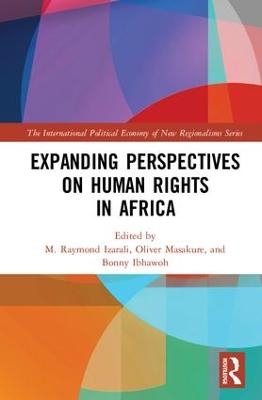
Expanding Perspectives on Human Rights in Africa
Routledge (Verlag)
978-1-138-30376-8 (ISBN)
This book draws attention to emerging issues around the rights of minorities, marginalized groups, and persons in Africa. It explores the gaps between human rights provisions and conditions, showing that although international human rights principles have been embraced in the continent, various minority groups and marginalized persons are denied such rights through criminalization and persecution.
African countries have a good record of signing and ratifying international and regional rights instruments but the political will and capacity for enforcing these with respect to minorities remain weak. International contributors to the book provide new perspectives on the rights of marginalized and minority groups in different parts of Africa and the extent to which they are deprived or denied entitlement to the universality and equality articulated in law. The authors show that human rights, while having come of age as a moral ideal, has not been fully entrenched in practice towards groups such as children, indigenous populations, the mentally ill, persons with disabilities, and persons with albinism.
This volume is geared toward scholars, students, human rights groups, policy makers, social workers, international organizations, and policy makers in the fields of criminology, security studies, development studies, political science, sociology, children studies, social psychology, international relations, postcolonial studies, and African Studies.
M. Raymond Izarali is a philosopher and Associate Professor in the Department of Criminology, Wilfrid Laurier University, Ontario, Canada. He is a Fellow and former director of the Tshepo Institute for the Study of Contemporary Africa at the same institution. His research interests include globalization, global terrorism and security, human rights theory, Africa, the Caribbean, and South Asia. He has published two co-edited books, The Contemporary Caribbean: Issues and Challenges (2013) and Security, Education and Development in Contemporary Africa (Routledge, London, 2017); and a sole edited book, Crime, Violence and Security in the Caribbean (Routledge, New York, 2018). Oliver Masakure is Associate Professor in Business Technology Management. He holds a joint appointment in the Lazaridis School of Business and Economics and Human Rights & Human Diversity at Wilfrid Laurier University, Ontario, Canada. He is a Fellow and former director of the Tshepo Institute for the Study of Contemporary Africa at the same institution. An applied economist, his research and publishing focus is on the economics of innovation, labour economics, and development economics. He previously published a co-edited book, Security, Education and Development in Contemporary Africa (Routledge, London, 2017). Bonny Ibhawoh is Professor of History and Global Human Rights at McMaster University, Ontario, Canada. He has taught in universities in Africa, the United Kingdom, the United States, and Canada. He was previously a Human Rights Fellow at the Carnegie Council for Ethics and International Affairs, New York, USA; a Research Fellow at the Danish Institute for Human Rights, Copenhagen, Denmark; and Associate Member of the Centre for African Studies, School of Oriental and African Studies (SOAS), University of London, UK. He is the author of several books and journal articles on African history and politics, human rights, and imperial history, including Imperialism and Human Rights (1998); Imperial Justice: Africans in Empire’s Court (2013); and Human Rights in Africa (2017). He is a member of the College of Scholars of the Royal Society of Canada.
INTRODUCTION Conceptualizing Human Rights Issues in Africa
SECTION I: AFRICA AND UNIVERSAL HUMAN RIGHTS
Chapter 1: Human Rights and the Politics of Regime Legitimation in Africa: From Rights Commissions to Truth Commissions
Chapter 2: Human Rights in Africa: The African Criminal Court
SECTION II: HUMAN RIGHTS AND GOVERNANCE
Chapter 3: Structural Inequalities, Exclusion and Minorities in Africa
Chapter 4: Old-Age Poverty, Human Rights, and Social Protection for the Elderly in Nigeria
Chapter 5: Youth Movements: Emerging Actors of the Struggles for Civil and Political Rights in Sub-Saharan Africa
Chapter 6: The Sustainable Development Goals as Human Rights
SECTION III: DISABILITY RIGHTS
Chapter 7: The United Nations Convention on the Rights of Persons with Disabilities: Historical Antecedents and Implications for Disability Rights and Socioeconomic Development in Africa
Chapter 8: Persons with Albinism: not ghosts, but human beings
Chapter 9: Disability Rights are human Rights: A Situational Analysis of Persons with Disabilities in Sierra Leone
Chapter 10: Mental Health Inequities in Africa: A Human Rights Perspective
SECTION IV: WOMEN’S RIGHTS
Chapter 11: Women’s Land Rights in Sub-Saharan Africa: Between the Law and Cultural Norms
Chapter 12: Women’s rights, food entitlements, and governance in urban Uganda
Chapter 13: Women’s Sexual and Reproductive Rights in Contemporary Africa
Chapter 14: Conclusion: Towards an Inclusive Approach to Human Rights in Africa in an Age of Globalization
| Erscheinungsdatum | 03.09.2018 |
|---|---|
| Reihe/Serie | New Regionalisms Series |
| Zusatzinfo | 6 Tables, black and white |
| Verlagsort | London |
| Sprache | englisch |
| Maße | 156 x 234 mm |
| Gewicht | 584 g |
| Themenwelt | Recht / Steuern ► EU / Internationales Recht |
| Recht / Steuern ► Öffentliches Recht ► Verfassungsrecht | |
| Sozialwissenschaften ► Politik / Verwaltung | |
| Sozialwissenschaften ► Soziologie | |
| ISBN-10 | 1-138-30376-3 / 1138303763 |
| ISBN-13 | 978-1-138-30376-8 / 9781138303768 |
| Zustand | Neuware |
| Haben Sie eine Frage zum Produkt? |
aus dem Bereich


